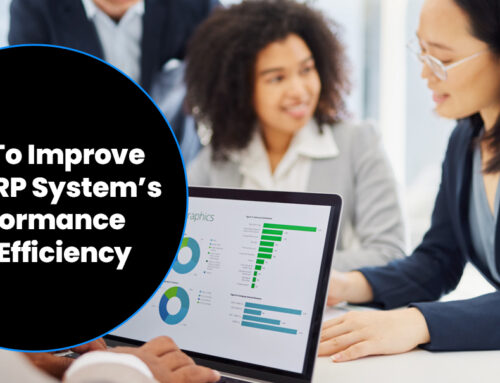
The implementation of a customized enterprise resource planning (ERP) platform will transform your company’s operations in dramatic ways, increasing operational efficiency and profit margins. But the highly-custom nature of an ERP platform requires a comprehensive consulting process. This maximizes your chances of seeing a smooth implementation and enjoying a platform that meets your exact needs as a business.
What Does ERP Consulting Entail?
The ERP consulting process involves two basic elements: understanding your company’s needs for the ERP platform and understanding precisely how your employees will be using the software.
The first phase guides the actual development of the ERP software with its many features and functionalities. The ERP consultation will begin by evaluating a company’s processes, how they use their existing software and what new features and functionalities will be included. It’s also wise to discuss what third-party platforms will be maintained, thereby necessitating integrations with the new ERP platform. It’s common for developers to use a comprehensive software requirements document as part of this initial consultation process.
The second phase involves the ERP implementation consultation. This evaluation focuses on the actual changeover from the company’s existing technology to the deployment of the new ERP platform. The consultants will develop a detailed plan that outlines processes such as when and how to:
- Transfer data to the new ERP platform;
- Create standard processes for the usage of the new software;
- Establish integrations with third-party interfaces;
- Train staff to use the new ERP software;
- Perform the official changeover to the new ERP platform; and
- Identify and resolve any residual issues with the ERP platform and its usage.
It’s important to understand that ERP deployment is far more than just installing a new piece of software and training staff on how to use the new system. It is a multi-faceted process that requires intensive planning and comprehensive support in order to see maximum benefit.
Why Does ERP Implementation Require Consulting?
An ERP implementation holds the potential to affect every department or division in a company. A rocky implementation can lead to frustration, lost productivity — even a total and chaotic halt in operations. Simply stated, this is one implementation that you don’t want to get wrong. Consultation is essential if you’re going to see a smooth company-wide transition to this new software interface.
ERP platforms also tend to be complex, multi-featured interfaces with dozens of functionalities. Experienced UI/UX developers always strive to make the interface easy to use and navigate, but change of any kind always comes with a learning curve. A solid implementation and deployment plan is critical.
The most successful ERP implementations have a few traits, including the following:
- Data Transition – Switching from one or more software platforms to a single ERP platform is no small feat. Data must be transferred to the new interface to ensure operational continuity. That requires a solid, well-architected plan. Data handling can be very complicated if a company is subject to regulatory or compliance requirements too. These requirements would need to be addressed in advance of any data migration so there is no lapse in security, documentation, auditing capabilities, etc.
- Processes – A new software platform means new processes and protocols, all of which need to be established and documented. Then, this information will be conveyed to the users via training sessions and training documents.
- Third-Party Integrations – Inevitably, there will be third-party platforms that a company will opt to retain. The developers will need to establish integrations with the new ERP platform, forming connections that allow for uninterrupted operational continuity. These integrations must be thoroughly tested and then documented for users, especially if users need to configure new connections when they begin using the new ERP software.
- Training – Training must be provided to employees so they’re well-versed on how the ERP platform works. This way, there is no gap in productivity when the official changeover occurs. If employees are distributed over a large area in multiple locations, training sessions will need to accommodate this need.
- Support – Support needs to be available when questions arise. Some companies opt to use a consultant from the development team. Others hire an in-house ERP professional “super user” — an employee of the company who is a highly-trained early adopter of the ERP platform. Whatever the case, you’ll need to have a plan in place to ensure any problems are addressed quickly and effectively during implementation and beyond the ERP deployment.
How Long Does an ERP Implementation Consultation Take?
The typical ERP software platform is a complex and customized piece of technology that will be used in connection with many — or even all — of a company’s operations. Developing a one-of-a-kind enterprise software portal is no small task and this means that the preparations for development and implementation tend to be equally complex.
It’s not uncommon for an ERP implementation consultation to take a few months. The timeframe for the consultation process will vary according to factors such as:
- The size of your company;
- The number and distribution of employees who will be using the ERP platform;
- The complexity and nature of your company’s operations;
- The number and complexity of the features that will be included in the ERP platform; and
- Other factors like the nature and size of deployment.
Each ERP development, implementation, and deployment is unique and custom-tailored to the company’s unique needs. For this reason, it’s prudent to discuss the timeframe early in the consultation process so all stakeholders are aware of what to expect.
An experienced ERP consultant will develop a comprehensive implementation plan to outline the steps that must be taken to ensure a smooth transition. It’s common for companies to perform a gradual, phased ERP implementation, but there is no one-size-fits-all solution. This underscores the importance of working with an experienced consulting firm that will create an individualized plan for your company.
At Cox-Little, ERP consulting solutions are among our specialties. Contact us to learn more about how our ERP consulting services can lead to a successful ERP implementation for your business.





